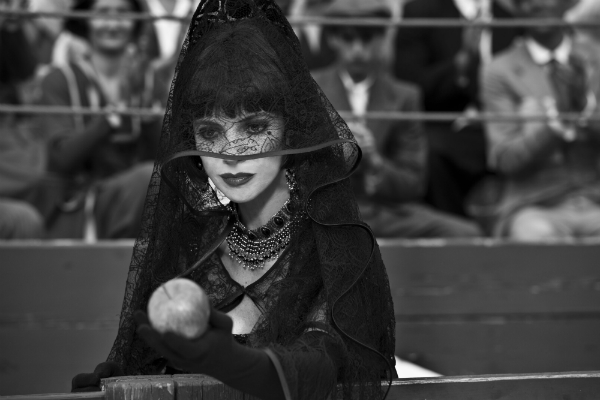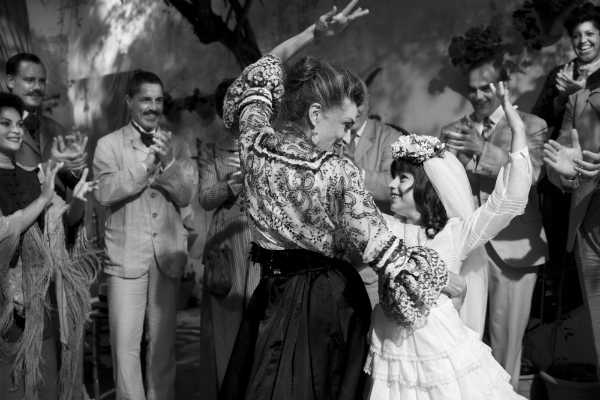 Un
largometraje dirigido por un reconocido director y guionista: Bigas Luna. Un
artista del cine que deja vacía la silla de first team del comité de honor. Un
mago de las películas que dio a conocer al gran público a actores y actrices
españoles como Javier Bardem, Penélope Cruz, Jordi Mollá o Verónica Echegui. Un
profesional del séptimo arte que fue reconocido internacionalmente al trabajar
con famosos actores extranjeros (Benicio del Toro, Dennis Hopper, Valeria
Marini,) y al recibir el León de Plata a la mejor dirección del Festival de
Venecia. Bigas: contigo cambió mi vida, como actriz y como persona. Me
ofreciste en Lola un personaje con el que me permitiste ser amiga de Angela
Molina, hiciste el casting por mí de un hombre, Patrick Bauchau, que cambió mi
carrera y mi vida y me enseñaste que la creatividad es lo único que no se puede
perder.
Un
largometraje dirigido por un reconocido director y guionista: Bigas Luna. Un
artista del cine que deja vacía la silla de first team del comité de honor. Un
mago de las películas que dio a conocer al gran público a actores y actrices
españoles como Javier Bardem, Penélope Cruz, Jordi Mollá o Verónica Echegui. Un
profesional del séptimo arte que fue reconocido internacionalmente al trabajar
con famosos actores extranjeros (Benicio del Toro, Dennis Hopper, Valeria
Marini,) y al recibir el León de Plata a la mejor dirección del Festival de
Venecia. Bigas: contigo cambió mi vida, como actriz y como persona. Me
ofreciste en Lola un personaje con el que me permitiste ser amiga de Angela
Molina, hiciste el casting por mí de un hombre, Patrick Bauchau, que cambió mi
carrera y mi vida y me enseñaste que la creatividad es lo único que no se puede
perder. Esa película que se rueda en el más allá está co-protagonizada por dos actrices de excepción. Por
un lado, Mariví Bilbao, una profesional de la interpretación, experimentada en
los escenarios y curtida frente a las cámaras. Una mujer que, a pesar de haber
participado en más de 40 largometrajes y cortometrajes, se ganó el cariño del
público con sus papeles en Aquí no hay quien viva y La que se avecina. Una
trabajadora incansable que vio reconocida su calidad con numerosos premios a
toda su trayectoria. Desde que trabajamos juntas, quisiste venir a first team. El trabajo primero y la enfermedad después no te dejaron, así que estamos
doblemente tristes porque tu sabiduría de vida hubiera iluminado nuestras aulas.
Esa película que se rueda en el más allá está co-protagonizada por dos actrices de excepción. Por
un lado, Mariví Bilbao, una profesional de la interpretación, experimentada en
los escenarios y curtida frente a las cámaras. Una mujer que, a pesar de haber
participado en más de 40 largometrajes y cortometrajes, se ganó el cariño del
público con sus papeles en Aquí no hay quien viva y La que se avecina. Una
trabajadora incansable que vio reconocida su calidad con numerosos premios a
toda su trayectoria. Desde que trabajamos juntas, quisiste venir a first team. El trabajo primero y la enfermedad después no te dejaron, así que estamos
doblemente tristes porque tu sabiduría de vida hubiera iluminado nuestras aulas. Y por otro lado, Sara Montiel, una intérprete
de canciones y personajes cinematográficos. Una de las primeras actrices españolas en cruzar
el charco y tocar el éxito en la meca
del cine, junto a Gary Cooper, Burt
Lancaster o Charles Bronson. Una mujer fatal en sus películas y una
mujer atrevida en la vida real, capaz de
participar en un videoclip con Fangoria, de protagonizar un anuncio para MTV o
la que no se cortó ni un pelo de echar un piropo a mi padre cuando le conoció
en un aeropuerto.
Y por otro lado, Sara Montiel, una intérprete
de canciones y personajes cinematográficos. Una de las primeras actrices españolas en cruzar
el charco y tocar el éxito en la meca
del cine, junto a Gary Cooper, Burt
Lancaster o Charles Bronson. Una mujer fatal en sus películas y una
mujer atrevida en la vida real, capaz de
participar en un videoclip con Fangoria, de protagonizar un anuncio para MTV o
la que no se cortó ni un pelo de echar un piropo a mi padre cuando le conoció
en un aeropuerto.
Assumpta Serna
Presidenta Fundación de Interpretación Cinematográfica first team
Redacción: Irene Cámara
Redacción: Irene Cámara









